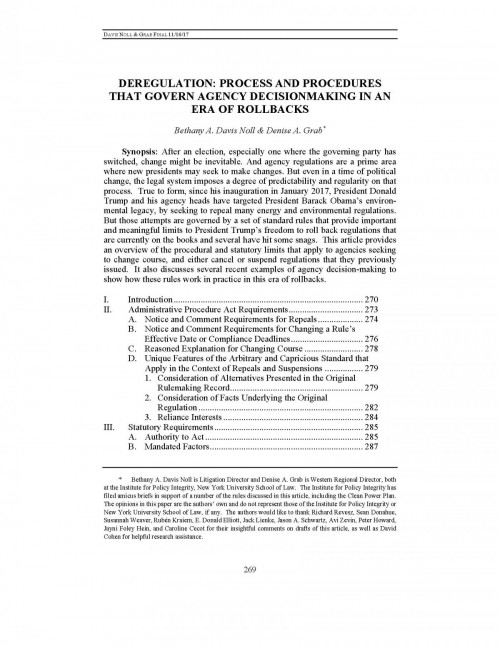-
Comments on EPA Methane Rule Stay
The Environmental Protection Agency (EPA) recently paused certain requirements to reduce methane leaks and emissions from new oil and gas facilities. In its “notice of data availability” for the proposed stay, EPA claims that the compliance costs of reducing these emissions exceed the benefits to the public and to industry. Our comments argue that EPA manipulated economics to make this claim. EPA undervalued the social cost of methane emissions and claimed that the forgone benefits of the rule are only $5.4 to 23 million per year, when EPA’s original estimates said the rule would create public benefits of $140-180 million per year.
-
Comments on Scope of Bill Impact Study to New York
New York State is carefully considering rate design reforms that could be adopted by utilities to provide efficient incentives for adoption of distributed energy resources. Studies on customer bill impacts of such rate design changes are necessarily going to be an important factor in moving forward. Our comments on the scope of bill impact studies emphasize that the effect on consumer bills is just one of the aspects to be considered when looking at rate design changes. In addition, we suggest that DPS give more guidance on the types of rate designs it’s considering, parameters used to model consumer behavior, and the time horizon that the studies cover.
-
Presentation to New York State Policymakers on Carbon Pricing
Bethany Davis Noll, our litigation director, and Dr. Jeffrey Shrader, our economics fellow, participated in a Technical Conference on carbon pricing in New York wholesale markets, hosted by the New York State Department of Public Service and the New York Independent System Operator. Davis Noll participated in the roundtable discussion on how best to address any potential leakage, expressed our support for efforts to address the issue, and discussed the legal implications of any such efforts. Shrader participated in the roundtable discussion on revenue allocation, expressed our support for carbon pricing as the most economically efficient and technology neutral way of internalizing climate damages from greenhouse gases, and discussed that there are many ways to use the revenue based on policy priorities as long as the revenue allocation does not undo the incentives carbon pricing creates.
-
Joint Letter to the House Committee on Natural Resources on the Social Cost of Carbon
We recently submitted a joint letter, coauthored by several environmental groups, to the House Committee on Natural Resources about the “Transparency and Honesty in Energy Regulations Act of 2017.” This act, H.R. 3117, seeks to direct agencies to ignore or drastically undervalue climate damages, and would seriously hamper future use and development of economically and scientifically sound estimates for the Social Cost of Carbon. This would result in federal government decisionmaking that fails to adequately account for the enormous social and economic consequences of climate change. In the letter, we urge the Committee to reject this and any other attempt to weaken, minimize or eliminate the requirement that agencies take into account the cost of climate change.
-
Comments to the Public Utilities Commission of Nevada on the Social Cost of Carbon
Nevada recently passed SB 65, a bill updating the state’s electricity planning process and boosting resources that provide economic and environmental benefits to the state. The Public Utilities Commission of Nevada subsequently held a series of formal and informal workshops and calls to shape the new regulation required under SB 65. We submitted joint comments with other stakeholders that included consensus language for several sections of the regulation. We also note in these comments that while stakeholders did come to an agreement on most issues, questions remain on how to define the social cost of carbon for the implementing regulation. Accordingly, we submitted supplemental comments to the PUC, discussing how the social cost of carbon is used by several other states, including in state electricity regulations and proceedings. We note that Colorado, Illinois, Maine, Minnesota, and New York use SCC estimates from the federal Interagency Working Group, and recommend that the Nevada PUC follow a similar approach.
-
Comments on Carbon Pricing in Wholesale Electricity Markets to New York
Our comments to New York State Department of Public Service and New York Independent System Operator encourage the state to pursue carbon pricing, as it is the most economically efficient and technology-neutral way to internalize climate damages from greenhouse gases. We argue that the price used for carbon damages, the mechanisms to prevent emission leakage, and the allocation of revenue collected from emitting sources will all affect the level of emissions reductions the state can achieve through policy. The design of the program will determine its success in reducing emissions, and we encourage New York to consider carefully the benefits of different implementation plans.
-
Amicus Briefs on New York’s Zero Emissions Credits
Policy Integrity submitted two amicus briefs to the U.S. Court of Appeals for the Second Circuit on New York’s Clean Energy Standard and Zero Emissions Credits, defending the state’s policy.
-
Comments to FERC on the Southeast Market Pipelines project supplemental EIS
We submitted comments to the Federal Energy Regulatory Commission (FERC), along with partners, on the Commission’s failure to use the social cost of greenhouse gases in the Southeast Market Pipelines Project supplemental environmental impact statement. In addition to the joint comments, we also submitted a set of comments on FERC’s failure to conduct a full assessment of substitute energy sources.
-

Deregulation: Process and Procedures That Govern Agency Decisionmaking in an Era of Rollbacks
Though change might be inevitable when a new governing party comes to power, the United States’ legal system imposes a degree of predictability and regularity on that change. Since his inauguration in January 2017, President Donald Trump and his agency heads have been working to repeal many energy and environmental regulations issued under prior administrations. But these attempts are governed by a set of standard rules that limit President Trump’s freedom to roll back regulations. This article, published in the Energy Law Journal, provides an overview of the procedural and statutory limits that apply to agencies seeking to change course and cancel or suspend regulations that they previously issued. It also discusses recent examples of agency decision-making to show how these limits work in practice.
-
Comments to Highway Administration and Army Corps on Addressing Greenhouse Gas Emissions
We submitted comments to the Federal Highway Administration (FHWA) and the US Army Corps of Engineers (USACE) on recent draft environmental impact statements (EISs), in which we stressed the importance of addressing climate impacts of proposed projects.
Viewing recent projects in Climate and Energy Policy





